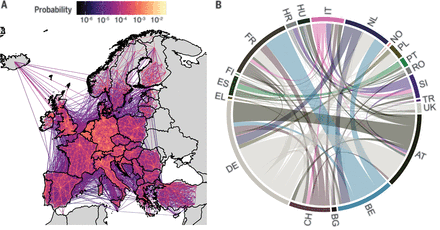As rates of new coronavirus disease 2019 (COVID-19) cases decline across Europe owing to nonpharmaceutical interventions such as social distancing policies and lockdown measures, countries require guidance on how to ease restrictions while minimizing the risk of resurgent outbreaks. We use mobility and case data to quantify how coordinated exit strategies could delay continental resurgence and limit community transmission of COVID-19. We find that a resurgent continental epidemic could occur as many as 5 weeks earlier when well-connected countries with stringent existing interventions end their interventions prematurely. Further, we find that appropriate coordination can greatly improve the likelihood of eliminating community transmission throughout Europe. In particular, synchronizing intermittent lockdowns across Europe means that half as many lockdown periods would be required to end continent-wide community transmission.
Read more here: https://science.sciencemag.org/content/369/6510/1465



